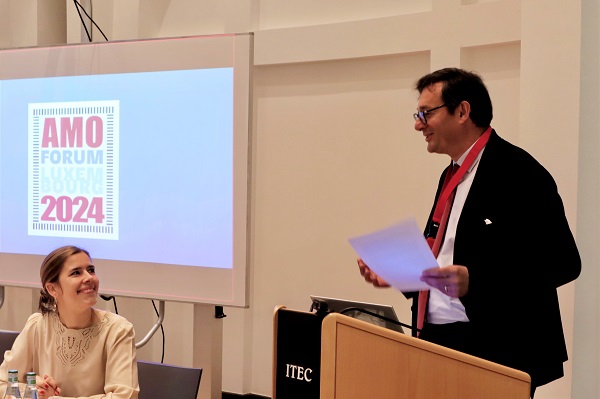 (L-R) Elisabeth Margue, Luxembourg's Minister of Justice; Michel Turk, Director of the Luxembourg Asset Management Office (BGA);
Credit: MJUST
(L-R) Elisabeth Margue, Luxembourg's Minister of Justice; Michel Turk, Director of the Luxembourg Asset Management Office (BGA);
Credit: MJUST
Luxembourg's Ministry of Justice has reported that the first first forum dedicated to asset management offices (AMO) took place at the Cité Judiciaire in Luxembourg-Ville on Wednesday 17 and Thursday 18 April 2024.
The AMO Forum Luxembourg 2024 went ahead on the initiative of Luxembourg's Minister of Justice, Elisabeth Margue, and the Luxembourg Asset Management Office (Bureau de gestion des avoirs - BGA). Organised jointly by the Luxembourg, Dutch and Europol asset management offices, this first forum dedicated exclusively to asset management offices brought together representatives from Germany, Belgium, Spain, France, Italy, Luxembourg, Monaco, the Netherlands, Portugal, the Czech Republic, Switzerland and Europol.
As reported by Luxembourg's Ministry of Justice, effective mechanisms for managing seized or confiscated assets are essential to enhance the work done upstream by the judicial authorities and meet international standards, particularly those provided for by the Financial Action Task Force (FATF).
At the European level, Directive 2014/42/EU provides that Member States take the necessary measures, in particular by establishing centralised offices, in order to guarantee the adequate management of frozen property with a view to their possible subsequent confiscation. The revenues from the sale of confiscated goods are intended for purposes of public interest or social purposes.
The new directive on asset recovery and confiscation, recently adopted by the European Parliament and the Council, will make asset management offices in particular responsible for helping to plan seizures. Furthermore, Member States should put in place effective tools for managing frozen or confiscated assets, such as central registers.
Reflecting on the work of the Luxembourg Asset Management Office (BGA), the ministry recalled that this was set up in June 2022 in the form of a separately managed state service, attached to the Ministry of Justice. During the mutual evaluation of Luxembourg in 2023, the FATF recognised the technical conformity of the system put in place by the legislator.
Since then, the BGA has been able to fully deploy its operational activities, noted the ministry. It is currently made up of a team of twelve people led by Michel Turk. It has two departments, one of which is dedicated to the management of sums, receivables, virtual assets and securities, and the other to the management of other assets. The BGA has a dedicated budget and has developed, in accordance with the law, its own data processing system which is powered by information on objects seized or confiscated in national and international criminal proceedings.
In terms of results, the sums seized are now centralised with the Consignment Office (Caisse de consignation) and invested by it. The evolution of the seized securities accounts, entrusted to the BGA, is monitored by two specialist managers who advise the magistrates on the advisability of alienating them in the event of a risk of depreciation. The BGA systematically recovers or destroys confiscated property or property whose ownership has fallen to the state and thus helps control storage costs and contribute to the state budget.
The money collected is used to repair part of the damage caused to society. As Michel Turk explained: "Part of the money collected from the sale of confiscated products will be allocated to the 'fund to combat certain forms of crime'. This fund is financed by the proceeds of confiscations ordered in the fight against money laundering, against the financing of terrorism and against drug trafficking. Since its creation, [this] fund has helped finance projects worth €44 million in Luxembourg and abroad. It is notably one of the major contributors to the United Nations Office on Drugs and Crime (UNODC)."
In her welcome speech, Justice Minister Elisabeth Margue noted that the Luxembourg government has set itself the principle of "crime does not pay" in its strategy to combat money laundering and the financing of terrorism. "Our strategy consists of dispossessing criminals of their ill-gotten assets and reallocating them for social purposes, thus helping to repair part of the damage created to society," she stressed.
The forum gave the floor to experts from Germany, France, Italy, the Netherlands and Luxembourg, particularly in the areas of detection, tracing and management of virtual assets and in the management of seized securities. Bilateral meetings were also held between delegations to discuss issues of mutual interest and sharing agreements.








